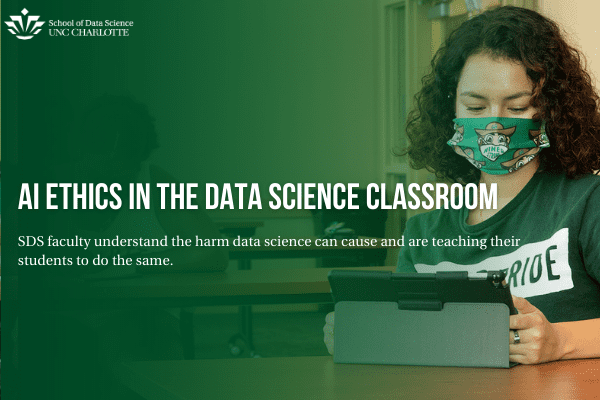AI Ethics In The Data Science Classroom

Automated resume screeners eliminating female candidates, facial recognition tools missing black faces and crime predictions determined by the neighborhood, not by the individual. These are just a few examples of the challenges and consequences that have emerged from the growth and development of artificial intelligence and machine learning models.
These issues have raised many ethical questions around fairness and justice, and how data science teams must consider the moral and ethical dimensions of their work prior to the development and implementation of AI and machine learning algorithms, and throughout their use of these technologies.
Anaconda, a data science software company, recently conducted a study with more than 2,000 data science students, academics and professionals. It revealed that only 15% of instructors taught AI ethics, and only 18% of students reported learning about the subject.
When UNC Charlotte established the first School of Data Science in the Carolinas and the only Bachelor’s of Science in Data Science program in the state, leaders behind the endeavour promised to do things differently. As an interdisciplinary program rooted in a four-college partnership, a commitment was made to incorporate liberal arts and science principles into a traditionally math and computing heavy major.
“One hundred percent of our data science courses at the undergraduate level address the ethical issues in data science,” said Dr. Angela Berardinelli, senior lecturer for the College of Computing and Informatics and the School of Data Science. “Other programs tend to offer a single elective on ethics or create a module within an introductory or advanced course.”
The major will not only inform students about data ethics in the classroom, but will also enable them to engage with community partners to observe the impact of data, privacy, and their work in real life.
“Ethics in data science shouldn’t be just a ‘one-time’ thing,” said Dr. Andrea Pitts, assistant professor of philosophy and graduate program director for the M.A. in Ethics and Applied Philosophy in the College of Liberal Arts and Sciences. “This is what I really like about the work that [SDS Executive Director] Doug Hague and my colleagues who are developing these courses are doing. They comprehend that ethics plays a vital role in everything a data scientist does, and understand the potentially harmful consequences of not addressing the ethical implications behind our work.”
Learning objectives surrounding ethics are folded in throughout the major. Students in the major begin with the basics of data ethics, gradually adding the evaluation of ethical debates and arguments, finally, they conclude by learning how to conduct and complete an ethical audit of real-world scenarios within data science.
“Not only will our students be able to identify the negative implications of a given data-driven practice, but they will also discover new methods and opportunities for addressing the important social issues of our time, including systemic injustices such as racism, sexism, and structural poverty” Pitts said. “The aggregation of mass data sets and the accompanying forms of data analysis that are now available did not exist just a few decades ago. Given these new techniques and the massive growth of data in the years ahead, upon graduation, we would love to see our students working in justice-oriented organizations to create real, positive change in the world.”
To help share what they’ve developed, Dr. Berardinelli and Dr. Pitts are presenting during the American Data Science Alliance (ASDA) annual meeting on Friday, October 16th, and will shed light on how ethics can be integrated throughout a bachelor’s of science degree in a data science program. Learn more and attend the event here.